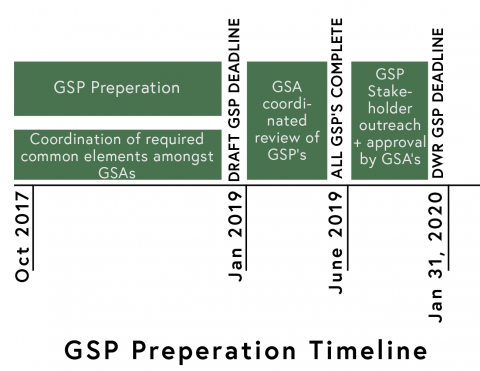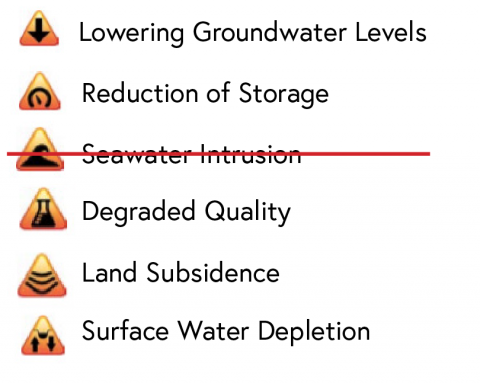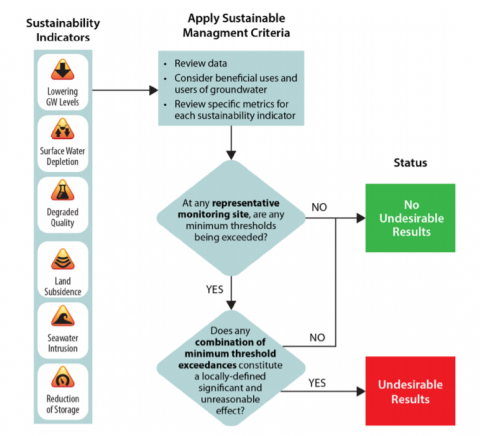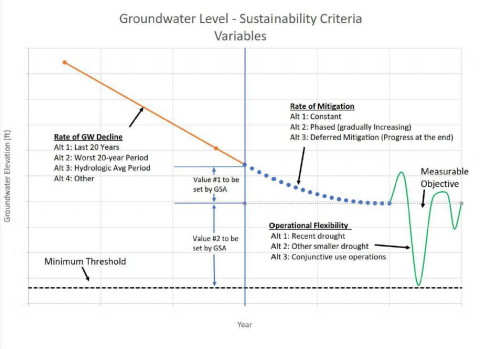At the April 25th study session, North Fork Kings GSA technical consultant Kevin Johansen of Provost & Pritchard presented on the current status of Groundwater Sustainability Plan (GSP) development. The presentation outlined technical requirements of the GSP and future milestones, a completed GSP draft by January 2019 being the nearest. The goal is for all GSA’s within the Kings subbasin to complete individual GSP drafts by the January 2019 deadline, leaving enough time to coordinate a comprehensive subbasin GSP. Final GSP’s must be submitted to the CA Department of Water Resources (DWR) by the required deadline of January 2020.
The timeline below indicates target deadlines.

Sustainable Management Criteria
Overview
The Sustainable Management Criteria is one of several Best Management Practices (BMP) guidance documents created by DWR. These documents were created to provide clarification, guidance, and examples to help GSA’s develop the GSP. DWR defines BMP’s as “the practice, or combination of practices, that are designed to achieve sustainable groundwater management and have been determined to be technologically and economically effective, practicable, and based on best available science.” The BMP’s are guidelines for reaching sustainability by 2040 under SGMA.
Provost & Pritchard discussed next steps to implement the Sustainable Management Criteria. Sustainability according to the Sustainable Management Criteria is achieved by avoiding “significant and unreasonable” results across six Sustainability Indicators. The consultants are working to coordinate amongst the seven GSA’s within the Kings subbasin to establish a methodology for defining “significant and unreasonable” results across the Sustainability Indicators. Once established, that methodology will be used by each GSA to set goals and define sustainability success. The six Sustainability Indicators are listed below. Seawater Intrusion is not relevant due to geographic location.

The “significant and unreasonable” results (ie. a specified level of groundwater elevation decline that is unacceptable) are defined by the GSA and must be accepted by DWR. The following metrics set by the GSA and approved by DWR serve as the measuring stick of sustainability across the Sustainability Indicators:
Minumum Threshold – the lowest result allowed in the worst case scenario. A quantitative value that when exceeded cannot cause an “undesirable result” and thus cannot be an arbitrary number.
Undesirable Result – a result defined by the GSA and approved by DWR in line with DWR’s suggested Best Management Practices. Undesirable results will be used by DWR to determine whether the sustainability goal has been achieved within a basin. Based on minimum threshold exceedances. If caused, sustainability is not successful.
Measurable Objective – average maintained result over the long-term. Must be met by 2040. Success metric of sustainability across Sustainability Indicators.
Each GSA will set its own results and objectives across the Sustainability Indicators using the methodology coordinated amongst the seven GSA’s in the Kings subbasin. For example, all GSA’s within the Kings Subbasin will use the same methodology to set their groundwater level minimum threshold, but for each GSA the specified level (lowest quantitative groundwater elevation allowed in the worst case scenario) will be different.
Example: Reaching Groundwater Level Stabilization
A closer look at the Sustainability Indicator: Lowering Groundwater Levels, illustrates the path toward sustainability under the Sustainable Management Criteria BMP. The relationship between Lowering Groundwater Levels, undesirable results, and minimum threshold is outlined in the flowchart below.

To avoid “significant and unreasonable” results of the Lowering Groundwater Levels, the minimum threshold may not be exceeded to a level that causes undesirable results.
Setting the minimum threshold and measurable objective values for groundwater level sustainability requires a methodology built using three sustainability criteria variables: rate of groundwater decline, rate of mitigation, and operational flexibility. The graphic below illustrates these variables in relation to the change groundwater elevation.
 Each variable can be determined a number of ways, and once determined are used in relationship with one another to set quantitative groundwater elevation levels for the measurable objective and the minimum threshold.
Each variable can be determined a number of ways, and once determined are used in relationship with one another to set quantitative groundwater elevation levels for the measurable objective and the minimum threshold.
Rate of groundwater decline is the rate at which groundwater levels have declined over a set period of time, and can be determined using one of three frameworks:
- Look at last 20 years, or
- Look at worst 20 years, or
- Look at hydrologic average period
Rate of mitigation is the rate at which improvements towards the measurable objective are made, and can be determined one of three ways:
- Constant (small, equal improvements each year), or
- Phased (slow at first with increased rate of progress over time), or
- Deferred mitigation (no progress until last 5 years; not recommended, unlikely to be accepted by DWR)
Operational Flexibility is the range of fluctuation in groundwater level allowed that still maintains the measurable objective average, taking into consideration dry versus wet years. The lowest range level of operational flexibility allowed is equal to the minimum threshold. The range of flexibility can be determined one of three ways:
- Recent drought or
- Other smaller drought or
- Conjunctive use operations (coordinated use of groundwater and surface water)
Provost & Pritchard is working to establish the methodology using the variables above. Using the example of Lowering Groundwater Levels, the technical consultants will recommend how to determine the rate of groundwater decline, the rate of mitigation, and the operational flexibility. The variables will then be used to establish the quantitative groundwater elevations for minimum threshold and measurable objective, and the rate at which the objective is achieved.
The North Fork Kings GSA will need to establish “significant and undesirable” metrics for each of the five relevant Sustainability Indicators. Realistic minimum thresholds and measurable objectives are key to reaching sustainability outlined by SGMA.
—
Additional GSP topics covered during the Study Session include the Water Budget, Monitoring Network, Land Subsidence, and the Proposition 218 Election. The full presentation can be found here: NFKGSA Board Study Session PowerPoint





